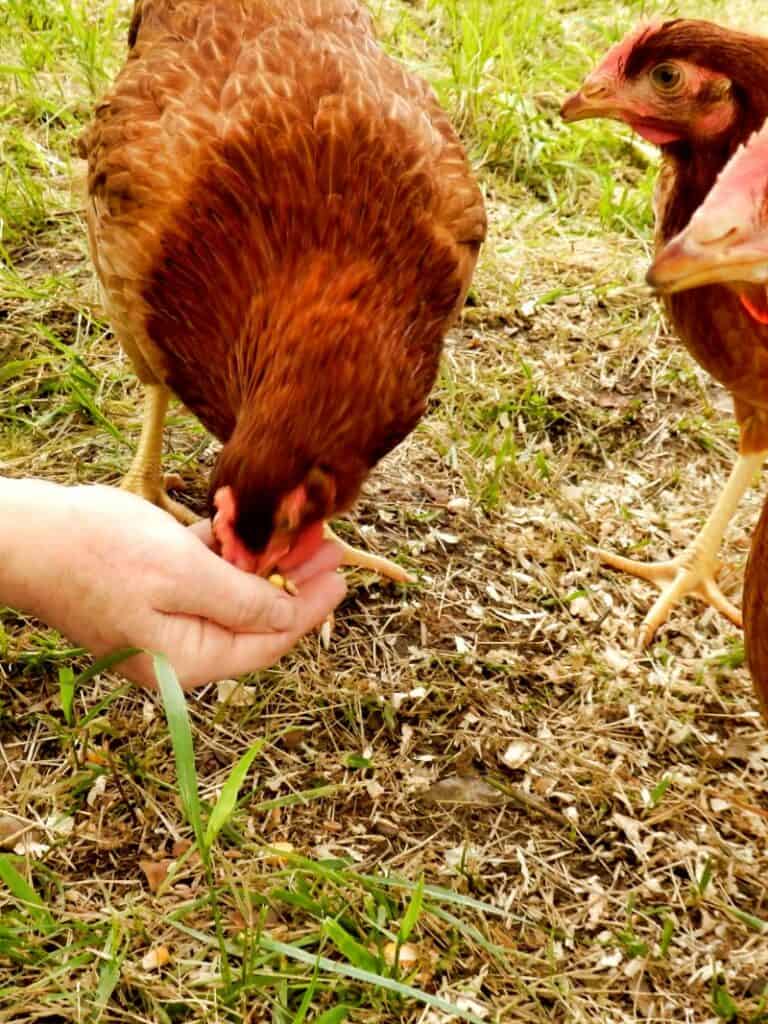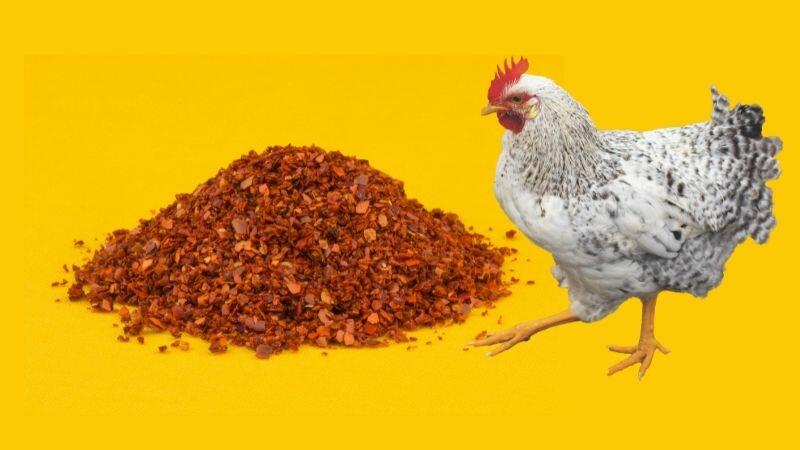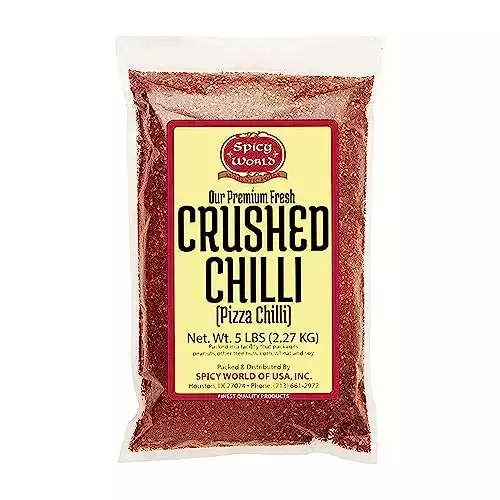As a chicken keeper, you want to do everything you can to keep your flock healthy. You may have wondered if adding some
Red pepper contains a compound called capsaicin that has antimicrobial properties. Research shows it can help chickens combat illness and deter predators. But can it also increase egg production?
This article will explore the science-backed benefits of using red pepper flakes for chickens. You’ll learn:
- How capsaicin in red pepper fights bacteria and parasites
- The truth about red pepper’s impact on eggs
- Proper feeding amounts and methods
- Potential risks to watch out for
While spicy seasonings aren’t for every chicken, red pepper flakes can be a healthy supplemental feed. Read on to get the full story on harnessing the power of this colorful
Why Use Red Pepper Flakes for Chickens?

The active compound in red pepper flakes is called capsaicin. Research shows it has antimicrobial and antiviral properties that can:
- Fight bacterial infections
- Disrupt parasites and worms
- Deter predators from feed
Let’s look closer at the science and evidence behind these benefits.
Fights Bacteria and Infections
Several studies have found that capsaicin inhibits the growth and spread of bacteria.
While it may not directly kill bacteria, capsaicin can prevent colonies from forming by disrupting communication and biofilm production.
This means adding small amounts of red pepper flakes to feed can help chickens combat common illnesses like salmonella, E. coli, and avian influenza.
Kills Parasites and Worms
Chickens frequently suffer from worms and parasites like nematodes, tapeworms, and mites. These can cause weakness, weight loss, and digestive issues.
Research shows that when combined with garlic and vinegar, red pepper flakes can help detach worms from the intestinal lining. The capsaicin creates an uncomfortable environment that drives parasites away.
Deters Pests and Predators
Have raccoons or squirrels been sampling your chicken feed? The scent and spiciness of red pepper flakes can deter these predators.
Sprinkle flakes around the perimeter of coops and gardens to safely repel hungry visitors looking for an easy snack.
Does Red Pepper Increase Egg Production?
Many chicken owners wonder if adding red pepper flakes to feed can ramp up egg laying. Unfortunately, there’s no solid evidence that red pepper boosts production.
Eggs rely more on breed, age, nutrition, and lighting. Here’s a reality check on what red pepper can (and can’t) do:
✅ May slightly increase egg size and yolk color
❌ Doesn’t directly increase number of eggs
❌ Minimal protein and calcium content
While small amounts of red pepper can enrich the nutritional value of eggs, it does not contain enough protein or calcium to substantially increase laying frequency or quantity.
How Much Red Pepper Do Chickens Need?
Red pepper flakes are safe for chickens. But how much should you add to their diet? Here are some general guidelines:
- 1-2% of feed for antimicrobial benefits
- 0.5-3% to enrich egg yolk color
- 1 teaspoon per bird daily maximum
Start with small amounts like 1⁄4 teaspoon per chicken and slowly increase every few days. Observe how your flock reacts.
Reduce or stop if you notice signs of irritation like watery eyes, sneezing, or loss of appetite.
Value Pack - Chili Flakes - by Spicy World
Feeding Chickens Oregano and Red Pepper Flakes
Two spices that complement each other well for boosting chicken health are oregano and red pepper flakes. Combining them can pack a powerful antimicrobial punch.
Like red pepper, oregano contains strong antibacterial, antiviral, and antifungal properties. The active compound in oregano is called carvacrol.
Here’s how oregano and red pepper can benefit chickens when used together:
- Fight a broad spectrum of pathogens and infections
- Reduce parasites like worms, mites, and protozoa
- Improve gut health and nutrient absorption
- Enhance immune system function
- Detoxify toxins and free radicals
Suggested Feeding Ratio
Most experts recommend mixing oregano and red pepper flakes in a 3:1 ratio for chickens.
For example, for every 1 teaspoon of red pepper flakes, add 3 teaspoons of dried oregano.
You can sprinkle this oregano-pepper blend on feed, mix it in treats, or offer free choice. Always provide plenty of fresh water.
Start with small amounts and monitor your flock. Scaling back or discontinuing use if any irritation occurs.
With its strong antiviral and anti-inflammatory properties, oregano combines perfectly with the antimicrobial power of red pepper flakes for comprehensive chicken health support.
How to Feed Chickens Red Pepper Flakes
You can add red pepper flakes to commercial feed or offer free choice in a separate dish. Here are a few feeding tips:
- Mix flakes into a batch of feed using gloves and a mask to avoid inhaling
spice dust. - Place flakes in cheesecloth bags and hang near roosts for chickens to nibble.
- Create red pepper “treat balls” by coating dried mealworms with oil and
spice . - Sprinkle flakes over scratch grains or vegetable treats.
- Add small pinches directly into feed dishes. Avoid overcrowding.
- Provide ample fresh water at all times to prevent dehydration.
Rotate red pepper with other healthy supplements like oyster shell, probiotics, and oregano to maximize benefits.
Alternative Feeds for Chickens
While red pepper flakes can provide health benefits, chickens also enjoy variety in their diets. Here are some other alternative feeding options:
Fresh Veggies and Fruits
Chickens naturally forage on plants, seeds, and insects. Offer chopped veggies like kale, carrots, squash, and fruits like melon, berries, and citrus. These provide important vitamins and minerals.
Leafy Greens
Greens like spinach, lettuce, and basil give chickens fiber and phytonutrients. Hang bundles or stuff treats inside.
Sprouted Grains
Sprouting grains and legumes increases their nutritional quality. Chickens enjoy wheats, barley, mung beans, and lentils.
Fermented Feed
Fermenting feed can preserve nutrients and increase probiotics. Try making fermented feed using yogurt, vegetable scraps, or apple cider vinegar.
Garden Scraps
Let chickens scratch through vegetable garden waste, leaf litter, grasses, and other compostable materials. This allows natural foraging.
Mealworms and Insects
Chickens instinctively hunt bugs for protein. Offer live or dried mealworms, crickets, soldier fly larvae and other insect treats.
Rotate these feeding options to give chickens nutritional variety beyond standard feed and the occasional red pepper flakes. This mimics their omnivorous, free-range ancestry.
Are There Any Risks to Chickens Eating Red Pepper?
Red pepper flakes are generally safe for chickens, but consider these precautions:
- Monitor for signs of digestive upset like diarrhea or appetite loss.
- Avoid letting chickens gorge on flakes to prevent intestinal irritation.
- Don’t rely solely on red pepper to treat illness. Consult a vet if symptoms persist.
- Store flakes securely away from pets and small children.
- Check expiration dates and buy food-grade
spice that hasn’t been contaminated.
While the capsaicin in red pepper won’t harm chickens, only offer as a supplement, not a meal replacement. Keep feed balanced and watch for any adverse effects.
Can Chickens Eat Hot Peppers?
Red pepper flakes provide a mild
While these peppers are too intense for human taste buds, chickens are not affected by the “heat” from peppers. Here’s why:
- Chickens lack the specific pain receptors (TRPV1) that detect capsaicin irritation in mammals.
- Their taste buds cannot register the spicy sensation we feel.
This means chickens can eat very spicy hot peppers without any discomfort. The peppers provide the same antimicrobial benefits as red pepper flakes.
However, take these precautions with hot peppers:
- Avoid overfeeding very hot varieties – they can still potentially irritate chickens’ digestive tract, especially when eaten in excess.
- Monitor for signs of intestinal upset like diarrhea, slowed egg production, or lethargy after feeding.
- Prevent chickens from overindulging on pepper plants in the garden.
- Remove spicy seeds which contain the highest capsaicin concentrations.
While the heat doesn’t bother them, chickens can experience other adverse effects if they binge on extremely hot peppers. Use moderation and variety when feeding spicy supplements.
What Should You Not Feed Chickens?
While chickens will peck at almost anything, some foods can be harmful. Avoid feeding chickens:
- Moldy or rotten foods – These can contain toxins.
- Raw potato peels, green potatoes – Contain solanine.
- Raw beans or peanuts – Uncooked contain phytohemagglutinin.
- Dried beans – Hard to digest if not cooked.
- Avocado skin and pits – Contain persin toxin.
- Citrus peels and pulp – Contain limonene.
- Onions, garlic, chives – Contain thiosulphates.
- Salty foods – Chickens shouldn’t consume excess salt.
- Sugary foods – Can cause crop yeast infections.
- Processed human foods – High in fat, salt, preservatives.
It’s also critical to never feed chickens:
- Moldy feed – Can cause aflatoxin poisoning.
- Spoiled eggs – Risk of salmonella and bacteria.
- Meat, fish, bone – Risk of paralytic disease salmonella.
Monitor what your flock has access to. When in doubt if something is safe, don’t take chances. Stick to quality commercial feed and known safe treats.
The Bottom Line: Should You Use Red Pepper Flakes for Chickens?
In moderation, red pepper flakes can benefit chicken health, deter pests, and possibly enrich eggs. But red pepper alone won’t increase egg production.
This inexpensive
Try sprinkling a dash of red pepper on feed to help keep your flock’s bacteria levels in check and intruders away from the coop. The antimicrobial power of capsaicin offers healthy protection!
Sources
- CyTA – Journal of Food: Capsaicinoids Content and Proximate Composition of Mexican Chili Peppers (Capsicum spp.) Cultivated in the State of Chihuahua
- National Library of Medicine: Antimicrobial and Anti-Virulence Activity of Capsaicin Against Erythromycin-Resistant, Cell-Invasive Group A Streptococci
- National Library of Medicine: Effect of Red Pepper (Capsicum frutescens) Powder or Red Pepper Pigment on the Performance and Egg Yolk Color of Laying Hens
- BIOMIN: An Alternative Way to Boost Egg Production in Layers
- Wiley Online Library: Omega-3 Fatty Acid Profile of Eggs from Laying Hens Fed Diets Supplemented with Chia, Fish Oil, and Flaxseed
- National Library of Medicine: TRPV1 Receptors and Signal Transduction
- National Library of Medicine: Involvement of a capsaicin-sensitive TRPV1-independent mechanism in lipopolysaccharide-induced fever in chicken







What’s the recommended ratio, of red pepper flakes, to layer feed? I’ve also read that oregano, basil & parsley, are good for the birds. Any suggestions or comments about that? Thx Kathi